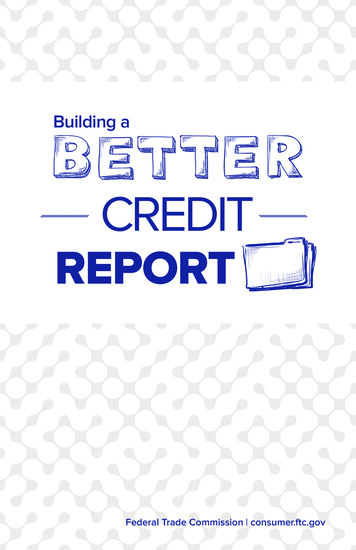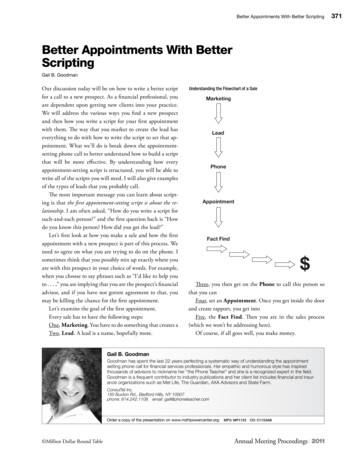
Transcription
Building acreditreportFederal Trade Commission consumer.ftc.gov
Shopping for a car?Applying for a job?Looking for a home?Getting your financial house in order?It’s time to check your credit report.
Building a Better Credit ReportWhat is a credit report?.2Why should I check my credit report?.2How do I get my credit report?.2How do I correct errors on my credit report?.3How long can negative information stay onmy credit report?.5How can my credit report affect my job application?.6What is a credit freeze?.6What is a fraud alert?.8What is a credit score?.9What are my options for dealing with debt?.11Got bad credit?Steer clear of credit repair scams.12For more information.13
What is a credit report?A credit report includes information on where you live, how youpay your bills, and whether you’ve been suedor have filed for bankruptcy. Nationwide creditreporting companies sell the information in yourreport to creditors, insurers, employers, andother businesses that, in turn, use it to evaluateyour applications for credit, insurance, employment, or renting aplace to live.Why should I check my credit report?Some financial advisors and consumer advocates suggest that youreview your credit report several times a year. Why? The information in it affects whether you can get a loan — andhow much you will have to pay to borrow money. To make sure the information is accurate, complete, and up-todate before you apply for a loan for a major purchase like ahouse or car, buy insurance, or apply for a job. To help repair possible identity theft. Identity thieves may useyour information to open new credit accounts in your name.Then, when they don’t pay the bills, the delinquent account isreported on your credit report. Inaccurate information like thatcould affect your ability to get credit, insurance, or even a job.How do I get my credit report?By law, you’re entitled to a free copy of your credit report fromeach of the nationwide credit reporting companies — Equifax,Experian, and TransUnion — once every 12 months. To order, visitannualcreditreport.com or call 1-877-322-8228.1
You may order reports from one, two, or all three of the companiesat the same time, or you may stagger your requests. Somefinancial advisors say staggering your requests during a 12-monthperiod may be a good way to keep an eye on the accuracy andcompleteness of the information in your reports. If you’re gettingready to apply for a loan or job, you might want to check all threereports at the same time.To learn more, read Free Credit Reports at consumer.ftc.gov.How do I correct errors on mycredit report?Both the credit reporting company and the information provider(that is, the person, company, or organization that providesinformation about you to a credit reporting company) areresponsible for correcting inaccurate or incomplete information inyour report once you bring it to their attention. Letting them knowinvolves two steps:Step OneTell the credit reporting company, in writing, what information youthink is inaccurate.A sample dispute letter is at consumer.ftc.gov. Your letter shouldidentify each item in your report you dispute, explain why youdispute the information, and ask that it be removed or corrected.Include copies (NOT originals) of documents that support yourposition. You may want to enclose a copy of your report withthe items in question circled. Send your letter by certified mail,“return receipt requested,” so you can document what the creditreporting company received. Keep copies of your dispute letterand enclosures.2
Credit reporting companies must investigate the items in questionusually within 30 days, unless they consider your dispute frivolous.They also must forward all the relevant data you provide about theinaccuracy to the information provider, which reviews the relevantinformation, investigates, and reports the results back to the creditreporting company. If the information provider finds the disputedinformation is inaccurate, it must notify all three nationwidecredit reporting companies so they can correct the informationin your file.What happens after the investigation?When the investigation is complete, the credit reportingcompany must give you the results in writing and a free copy ofyour report if the dispute results in a change. If an item is changedor deleted, the credit reporting company cannot put the disputedinformation back in your file unless the information provider verifiesthat it is accurate and complete. The credit reporting company alsomust send you written notice that includes the name, address, andphone number of the information provider.If you ask, the credit reporting company must send notices ofany corrections to anyone who received your report in the pastsix months. You can have a corrected copy of your report sentto anyone who received a copy during the past two years foremployment purposes.What if the investigation doesn’t resolve my dispute?Ask that a statement of the dispute be included in yourfile and in future reports. You also can ask the credit reportingcompany to provide your statement to anyone who received acopy of your report in the recent past. Expect to pay a fee forthis service.3
Step TwoTell the information provider, in writing, that you dispute an item inyour credit report.A sample dispute letter is at consumer.ftc.gov. Include copies (NOToriginals) of documents that support your position. If the providerlisted an address on your credit report, send your letter to thataddress. If no address is listed, contact the provider and ask for thecorrect address to send your letter. If the information provider doesnot give you an address, you can send your letter to any businessaddress for that provider.What if the provider continues to report the disputeditem to a credit reporting company?The provider must let the credit reporting company know aboutyour dispute. And if you are correct — that is, if the information youdispute is found to be inaccurate or incomplete — the informationprovider must tell the credit reporting company to update or deletethe item.To learn more, read Disputing Errors on Credit Reports atconsumer.ftc.gov.How long can negative information stayon my credit report?A credit reporting company can report most accurate negativeinformation for seven years and bankruptcy information for 10years. There is no time limit on reporting information about criminalconvictions; information reported in response to your applicationfor a job that pays more than 75,000 a year; and informationreported because you’ve applied for more than 150,000 worthof credit or life insurance. Information about a lawsuit or an unpaid4
judgment against you can be reported for seven years or until thestatute of limitations runs out, whichever is longer. The standardmethod for calculating the seven-year reporting period starts withthe date that the event took place.How can my credit report affect myjob application?When you apply for a job, employers look at the application youcomplete and the resume you prepare. Some employers alsocheck into your background before they hire you. Dependingon the employer and the job, that background information mightinclude your employment history, your driving record, criminalrecords, and your credit report.An employer must get your permission before asking for a reportabout you from a credit reporting company or any other companythat provides background information. If you don’t give your okay,your application for employment may not get a second look. That’sup to you. But if you don’t get the job because of information inyour report, the employer has some legal obligations: First, theemployer must show you the report; second, the employer musttell you how to get your own copy. The report is free if you ask for itwithin 60 days of learning the bad news.To learn more about your rights, read EmploymentBackground Checks at consumer.ftc.gov.What is a credit freeze?A credit freeze, also known as a security freeze, lets you restrictaccess to your credit report, which in turn makes it more difficultfor identity thieves to open new accounts in your name. That’sbecause most creditors need to look at your credit report before5
approving a new account. If they can’t see your file, they may notextend the credit.You may want to place a credit freeze on your credit reports ifyou’re concerned about the potential consequencesof data breaches.To place a freeze on your credit reports, contacteach of the nationwide credit reporting companies:Equifax — 1‑800‑525‑6285; equifax.comExperian —1‑888‑397‑3742; experian.comTransUnion — 1‑800‑680‑7289; transunion.comYou’ll need to supply your name, address, date of birth, SocialSecurity number and other personal information. Fees vary basedon where you live; they commonly range from 5 to 10.A credit freeze does not: affect your credit score prevent you from getting your free annual credit report keep you from opening a new account, applying for a job,renting an apartment, or buying insurance. If you’re doing anyof these, you’ll need to lift the freeze temporarily, either for aspecific time, or for a specific party, say, a potential landlord oremployer. The cost and lead times to lift a freeze vary, so it’sbest to check with the credit reporting company in advance. prevent a thief from incurring charges on your existingaccounts. You still need to monitor all bank, credit card andinsurance statements for fraudulent transactions.6
What is a fraud alert?Unlike a credit freeze that locks down your credit, a fraud alertallows creditors to get a copy of your credit report as long as theytake steps to verify your identity. For example, if you provide atelephone number, the business must call you to verify whetheryou are the person making the credit request. Fraud alerts may beeffective at stopping someone from opening new credit accountsin your name, but they may not prevent the misuse of your existingaccounts. You still need to monitor all bank, credit card andinsurance statements for fraudulent transactions.There are three types of fraud alerts:Initial Fraud AlertIf you’re concerned about identity theft, but haven’t yetbecome a victim, this fraud alert protects your credit fromunverified access for at least 90 days. You may want to placea fraud alert on your file if your wallet, Social Security card, orother personal, financial or account information are ever lostor stolen.Extended Fraud AlertFor victims of identity theft, an extended fraud alert protectsyour credit for seven years.Active Duty Military AlertFor those in the military who want to protect their credit whiledeployed, this type of fraud alert lasts for one year.To place a fraud alert on your credit reports, contact one of thenationwide credit reporting companies. A fraud alert is free. Youmust provide proof of your identity. The company you call must7
tell the other companies; they, in turn, will place an alert on theirversions of your report.To learn more, visit ftc.gov/idtheft.What is a credit score?Credit scoring is a system creditors use to help determine whetherto give you credit. It also may be used to help decidethe credit terms you are offered or the rate you willpay for the loan.Information about you and your credit experiences, like your billpaying history, the number and type of accounts you have, whetheryou pay your bills by the date they’re due, collection actions,outstanding debt, and the age of your accounts, is collected fromyour credit report. Using a statistical program, creditors comparethis information to the loan repayment history of consumers withsimilar profiles. For example, a credit scoring system awards pointsfor each factor that helps predict who is most likely to repay a debt.The total number of points — a credit score — helps predict howcreditworthy you are: how likely it is that you will repay a loan andmake the payments when they’re due. A higher credit score istaken to mean you are less of a risk, which, in turn, means you aremore likely to get credit or insurance — or pay less for it.What factors affect my credit score?Credit scoring systems are complex and vary among creditors orinsurance companies and for different types of credit or insurance.If one factor changes, your score may change — but improvementgenerally depends on how that factor relates to others the systemconsiders. Only the business using the system knows what might8
improve your score under the particular model they use to evaluateyour application.Nevertheless, scoring models usually consider the followingtypes of information in your credit report to help compute yourcredit score:Have you paid your bills on time?You can count on payment history to be a significant factor. Ifyour credit report indicates that you have paid bills late, hadan account referred to collections, or declared bankruptcy, itis likely to have a negative effect on your score.Are you maxed out?Many scoring systems evaluate the amount of debt you havecompared to your credit limits. If the amount you owe is closeto your credit limit, it’s likely to have a negative effect on yourscore.How long have you had credit?Generally, scoring systems consider your credit track record.An insufficient credit history may affect your score negatively,but factors like timely payments and low balances canoffset that.Have you applied for new credit lately?Many scoring systems consider whether you have applied forcredit recently by looking at “inquiries” on your credit report.If you have applied for too many new accounts recently, itcould have a negative effect on your score. Every inquiryisn’t counted: for example, inquiries by creditors who aremonitoring your account or looking at credit reports to make“prescreened” credit offers are not considered liabilities.9
How many credit accounts do you have and whatkinds of accounts are they?Although it is generally considered a plus to have establishedcredit accounts, too many credit card accounts may havea negative effect on your score. In addition, many scoringsystems consider the type of credit accounts you have. Forexample, under some scoring models, loans from financecompanies may have a negative effect on your credit score.Scoring models may be based on more than the information inyour credit report. When you are applying for a mortgage loan,for example, the system may consider the amount of your downpayment, your total debt, and your income, among other factors.Improving your score significantly is likely to take some time, butit can be done. To improve your credit score under most systems,focus on paying your bills in a timely way, paying down anyoutstanding balances, and staying away from new debt.To learn more, read How Credit Scores Affect the Price ofCredit and Insurance at consumer.ftc.gov.What are my options for dealingwith debt?Many people face a financial crisis at some point in their lives.Whether the crisis is caused by illness, the loss of a job, oroverspending, it can seem overwhelming. But often, it can beovercome. Your financial situation doesn’t have to go from badto worse.If you get into financial hot water, there are options: creditcounseling from a reputable organization, debt consolidation, or10
bankruptcy. Which path works best for you depends on your levelof debt, your level of discipline, and your prospects for the future.Contact your creditors immediately if you ever have trouble makingends meet. Tell them why it’s difficult for you to pay your bills,and try to work out a modified payment plan that reduces yourpayments to a manageable level. Don’t wait until your accountshave been turned over to a debt collector. At that point, yourcreditors have given up on you.To learn more, read Coping with Debt at consumer.ftc.gov.Got bad credit?Steer clear of credit repair scamsYou see the ads in newspapers, on TV, and online. You hearthem on the radio. You get fliers in the mail, email messages, andmaybe even calls offering credit repair services. They all make thesame claims:Credit problems? No problem!We can remove bankruptcies, judgments, liens, andbad loans from your credit file forever!We can erase your bad credit — 100%guaranteed.Create a new credit identity — legally.Do yourself a favor and save some money, too. Don’t believe theseclaims: they’re very likely signs of a scam. Indeed, attorneys atthe Federal Trade Commission, the nation’s consumer protectionagency, say they’ve never seen a legitimate credit repairoperation making those claims. The fact is there’s no quick fix for11
creditworthiness. No one can legally remove accurate and timelynegative information from a credit report. You can improve yourcredit report legitimately, but it takes time, a conscious effort, andsticking to a personal debt repayment plan.To learn more read, Credit Repair Scams atconsumer.ftc.gov.For more informationThe FTC works to prevent fraudulent, deceptive and unfairbusiness practices in the marketplace and to provide informationto help consumers spot, stop and avoid them. To file a complaintor get free information on consumer issues, visit ftc.gov or call tollfree, 1-877-FTC-HELP (1-877-382-4357); TTY: 1-866-653-4261.Watch a video, How to File a Complaint, atconsumer.ftc.gov/media to learn more. The FTC enters consumercomplaints into the Consumer Sentinel Network, a secure onlinedatabase and investigative tool used by hundreds of civil andcriminal law enforcement agencies in the U.S. and abroad.12
Federal Trade Commissionconsumer.ftc.govMay 2014
credit scoring is a system creditors use to help determine whether to give you credit. it also may be used to help decide the credit terms you are offered or the rate you will pay for the loan. information about you and your credit experiences











